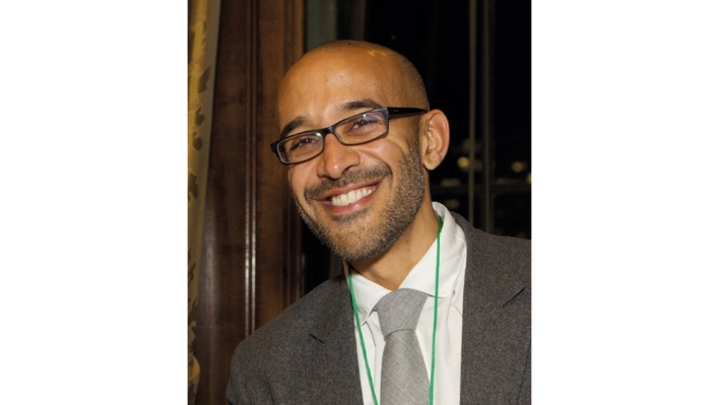RTS/Focal Jane Mercer Memorial Lecture by Anthony Wall. Report by Matthew Bell
A packed audience for this year’s RTS/Focal Jane Mercer Memorial Lecture was treated to Arena Series Editor Anthony Wall’s experiments with archive footage on the BBC’s idiosyncratic arts strand. Within Wall’s output, Christopher Columbus, Johnny Rotten, Shirley Bassey and Kendo Nagasaki happily share screen time.
Wall joined the BBC’s long-running arts strand in 1979 and has been editor since 1985. During this time, Arenahas won six RTS awards and nine Baftas, as well as many other prizes from around the world. He peppered his lecture – which is held annually in memory of the first chair of the Federation of Commercial Audiovisual Libraries International, Jane Mercer – with clips from some of Arena’s most memorable films.
The Arena Editor argued that the “comfortable, safe idea of archive, which conjures up an image of miles of film cans with cobwebs on them” is redundant now that every institution and, indeed, person with a mobile phone produces video.
Wall and the late director Nigel Finch’s fascination with light entertainment led to one of Arena’s greatest films, My Way, about the much-recorded song. “It’s like a capitalistic equivalent of The Internationale, this mad idea that you can do everything your way. The song is so wonderfully bombastic,” he said.
The much-loved film, from which Wall played a clip at the lecture, used archive footage to comic effect, cutting together film of Shirley Bassey belting out My Way with musicologist Wilfrid Mellers dissecting the song’s melody.
Occasionally, Arena has covered subjects where little or no archive exists.
Film-makers, explained Wall, can solve such problems by using a little imagination.
For the 1986 film from Nicaragua, Maytime on the Mosquito Coast, Wall wanted to show Columbus discovering the Central American country on his last journey to America in 1502.
The solution? He used a clip from the 1949 movie, Christopher Columbus, starring Fredric March.
“The idea was to come up with a confection that would be a visual, online equivalent of a three-minute pop song"
“Broadly speaking, archive was used in an illustrative way and there’s nothing wrong with that. The idea was that it has a fixed meaning,” he said.
Now, Wall argued, “archive is not imprisoned in that way. What we can now do, in a multiplicity of methods and media, is to write new rules in archive that render it dynamic and potentially creative in the way it suggests the future as much as the past.”
Arena is renowned for its playful use of archive. “You definitely do your best work when you don’t know what you’re doing, because, if you do know what you’re doing, why bother?” argued Wall.
Paul Tickell’s 1995 film, Punk and the Pistols, intercut scenes from vintage British sci-fi film Quatermass and the Pit, in which the country was threatened by alien invasion, with clips of punk bands to mock the moral panic that punk generated in mid-1970s British society.
Scenes from Punk and the Pistols were shown at the lecture, as well as a sequence from Masters of the Canvas, which explored pop artist Peter Blake’s fascination with masked wrestler Kendo Nagasaki.
More recently, Wall has been making “mash ups” of Arena films, rearranging scenes and images to create new forms and reveal new meanings. These include condensing the strand’s first 200 films into just five minutes. Other themed three-minute films have followed, including Fancy a Drink?, which includes scenes featuring booze from Arena films and Animal Crackers.
“The idea was to come up with a confection that would be a visual, online equivalent of a three-minute pop song,” he recalled.
“The Arena films are intact – over my dead body would those films be butchered. They exist in their true form, but they are also a treasure trove,” he explained. “We came up with ever more preposterous ideas for these three-minute mashes. I thought of one called Armed and Extremely Dangerous, but didn’t think there would be much of that. [In fact] there’s about 80 Arenas where people wield a weapon of some sort, often in anger.”
Modern TV, though, he argued, is not suited to short films, because of its rigid scheduling. “One of the things that has so corrupted TV is this absolute insanity of half-an-hour, 60-minute and 90-minute programmes,” he said. “Television is such a conservative medium.”
The internet has become the natural home for Arena’s mash-ups and archive experimentation. Wall’s latest project is the Arena Hotel, a portal for the strand’s content on the BBC website. As you would expect, the clips are arranged in a typically artful way: viewers can take a tour of the hotel’s rooms, including a ballroom, nightclub and health spa, and watch themed clips from the Arena archive.
The RTS/Focal Jane Mercer Memorial Lecture, “Archive – past, present and future”, was held at ITV Studios in central London on 14 May. The producer was Carol Owen.







